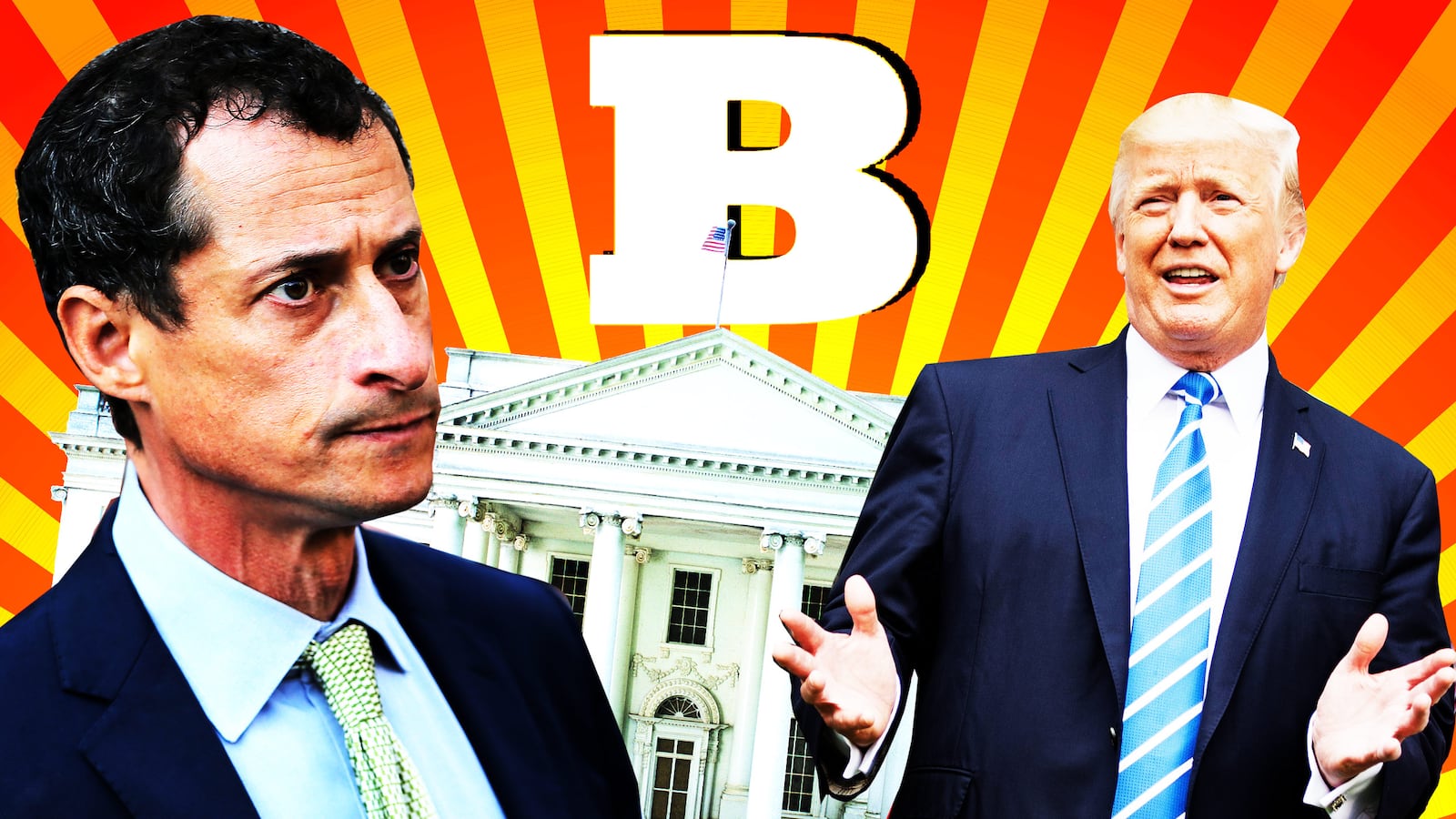With Anthony Weiner headed to prison, I flashed back to two big moments involving big leaks of private communications that happened not long before the rise of Trump and foreshadowed it. Both somehow stayed buried in the media’s memory hole over the last 20 months, and they point to how far our polite conversation now lags behind our actual politics.
First, the “exposing” of JournoList, the private Google Group conversation among center-to-left academics and journalists (including at least two of my current colleagues at The Daily Beast) at top publications curated by young don of center-left conventional wisdom Ezra Klein.
Mickey Kaus broke the news that journalists were—gasp!—talking privately with one another back in 2007. But it wasn’t until a report in THE POLITICO (where I was an editor at the time, incidentally) in early 2009 that the sound Inside the Echo Chamber became a big story in conservative circles, something to latch on to after a historic election to “prove” the media had done its part to rig things for Barack Obama.
Like the old joke about the Jew who only reads Nazi papers, I took a sort of comfort as a card-carrying member of the MSM as its reach declines to read dispatches from conservatives obsessed with its reach.
That drumroll seemed to peak in 2010, when The Daily Caller, the right-wing news outlet edited by Tucker Carlson—then four years removed from having his talking-head career DESTROYED by Jon Stewart, long before late-night comedians going viral by doing that was a thing, and two years removed from being the first “celebrity” to fall on Season 3 of Dancing With the Stars—declared that “The Fix was in: Journolist e-mails reveal how the liberal media shaped the 2008 election.”
Emails showed that the center-to-left journalists discussing this amongst themselves during the election collectively agreed that questions to Obama about his Chicago pastor’s fiery anti-American statements were a smear job. A couple people talked on the thread about calling prominent conservatives racists in response; several others wrote an open letter to the ABC debate moderators objecting to their questions to Obama about Wright.
I’ve always stayed clear of semi-secret and status-marking groups and conversations, other than journalist Twitter, because I think such things, including journalist Twitter, tend to warp individual judgement and create the needless appearance of collusion. Marx applies: I wouldn’t trust any club that would have me.
And I had a different view of Wright in 2008. It seemed obvious that an African-American military veteran then in his late 60s and with a big following in Chicago might be angry at America (“The government gives them the drugs, builds bigger prisons, passes a three-strike law and then wants us to sing ‘God Bless America.’ No, no, no, God damn America, that’s in the Bible for killing innocent people. God damn America for treating our citizens as less than human. God damn America for as long as she acts like she is God and she is supreme”). And it seemed ridiculous for an ambitious South Side politician to say he’d attended that reverend’s services for years without registering even a hint of that anger.
In any event, Obama put out the political fire by giving his famous speech calling for a “national conversation about race”—one predictably followed by fulsome praise, including by many of the members of JournoList, and none of that conversation.
When The Daily Caller dredged up the journalists’ talk about Wright, many of the same conservatives who’d end up playing with racist fire about whether or not Obama was even an American, or a Christian, were red hot about how the fix had been in, as if millions of Americans would have voted differently if not for Ezra Klein’s wicked email chain.
This is all a rabbit hole, one involving lots of people still prominent in the confined little world of national punditry, so I understand why this didn’t become a big retro storyline. But it’s bizarre to me that the chattering class didn’t once recall this not-so-old history about mega-leaks of private correspondence as the truther who finally replaced Obama in the Oval Office kept fanning the “fake news” fires that John McCain (though not running mate Sarah Palin) and Mitt Romney kept the hell away from.
For the life of me, though, I can’t understand how no one I saw circled back to the other big moment that augured our weird new normal—you could even say the moment when Trump became president. And it all started with a “hack.”
That was back in June of 2011, when Anthony Weiner—regular on MSNBC, frontrunner to be New York’s next mayor, and Chuck Schumer protege married to Hillary Clinton’s top aide—held his first press conference about his, err, social-media problem, days after Andrew Breitbart—Matt Drudge protégé and patron saint of the war against the MSM—first reported on them on his Big Government website and vowed to release more even as the congressman insisted that he’d been the victim of a “prank” or a”hack.”
Weiner was supposed to speak at 4 p.m., but a few minutes before then, Breitbart himself, who’d spent the day trickling out creepy images of Weiner online, grabbed the mic and held his own press conference for 15 minutes, all but waving the congressman’s crotch shot before a crowd of incredulous journalists: “Do you know what I’d be accused of if I—if I released this photo? I’m doing this to save his family, okay? And if this guy wants to start fighting with me again, I have this photo—that I absolutely do—I’m not doing this for nefarious purposes. I have this photo of him… It is news, my friend, it is news. And I know of countless other web sites and news organizations that would put this out there.”
He stayed in the room after that, as Weiner himself—without his then pregnant wife beside him—finally fessed up, nattering on about how “inappropriate conversations” and the “aberration from which I’ve learned” for 27 painful minutes while insisting he’d broken no law (though he couldn’t say for sure that all the women he’d talked with online were of age, or actually women for that matter) and wouldn’t resign his office.
Weiner avoided the first several questions from journalists about whether he wanted to apologize for his “hack” claims now that he said he was coming clean. Finally, Breitbart called out, “I’m right here.” A minute later, Weiner gave in and said it: “I apologize to Andrew Breitbart.”
We know what happened next—less than a week later, Weiner gave in and resigned as humiliating details kept trickling out. Breitbart died after a heart attack the next year (or so the MSM would have you think; his death spurred endless conspiracy theories among the site’s true believers). Weiner, with little idea what to do with his life outside of elected office, returned the following year to run for mayor and surged to the top of the field before the Carlos Danger sexting sequel brought him back down. And then it was the FBI’s probe of Weiner’s third sexting explosion, this one with a minor who may have been paid off by a shady news outlet to entice him and who in any event he knew to be underage and nonetheless began sexting with—that led James Comey to reopen weeks before the election the Clinton email investigation he’d closed months earlier, and that may well have cost her the White House.
It’s plenty weird that the namesake founder of the MSM-loathing ideological news site that Steve Bannon turned into the flagship outlet of the Trump wave hijacked the stage of the guy whose personal issues helped cost Clinton the presidency. That Breitbart the blackmailer—“I’m doing this to save his family, okay?”—ended up vindicated, to some extent, by Weiner the liar.
But what’s weirder than that is how a huge news story in 2011 with two central characters who played outsized roles in last year’s election would go unrecalled in the course of it. That’s something for journalists to discuss when we talk amongst ourselves.






